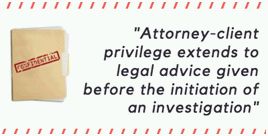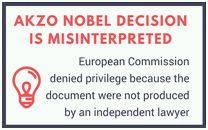On November 16, 2017, the Administrative Court of Ankara took a decision which will set a crucially important precedent by accepting our claims with regards to recognition of attorney-client privilege in competition proceedings and also enforcing the reputation of the legal profession. The Court examined an action for annulment regarding a decision of the Turkish Competition Authority (TCA), which stirred great concern as to the status of documents that are actually protected by the attorney-client privilege.

On a brief note, the TCA, at the end of 2016, announced the initiation of a preliminary investigation against a retail electricity provider to determine whether the undertaking abused its dominant position through exclusionary behavior. During the course of the preliminary inquiry, the TCA dawn raided offices of investigated parties so as to gather information necessary to build a case. During the dawn raid, case handlers discovered a report prepared by lawyers of an independent law firm within the scope of a competition compliance program. Despite objections that said documents are protected under attorney-client privilege and therefore shall be returned, case handlers obtained a copy of the document in a sealed envelope. The TCA later evaluated our objections and the content of these documents and resolved that they shall not enjoy the protection provided by attorney-client privilege. Accordingly, these privileged documents were used by the case handlers in drafting the Investigation Report. This decision of the TCA, which was later appealed, naturally caused great concern with regard to the protection of privileged documents in competition proceedings.
Background
Privilege attributed to communications between attorney and client in Turkey originally stem from the Attorneyship Act. The said legislation provides that attorneys are in fact prohibited from disclosing information which has been confided in them or that they learned in the performance of their duties as an attorney. It should be noted that attorney-client privilege constitutes an inherent element of the right to defense, which is recognized as a fundamental right as per the Constitution of the Turkish Republic. Such privilege is strictly preserved under criminal procedure as well. So much that the Criminal Procedure Act stipulates the immediate return of privileged documents seized during a criminal investigation, in case the court decides that the document is a product of the attorney-client relationship.

It is in fact surprising that attorney-client privilege, which is an internationally recognized concept, is not explicitly regulated under the Act on the Protection of Competition (Competition Act). Moreover, the Competition Act confers broad powers to the TCA to request information from public institutions and organizations, undertakings and associations of undertakings. The TCA is also authorized to conduct on the spot inspections at premises of undertakings during which interested parties are obliged to provide copies of information, documents and books requested. Despite extensive authorities conferred to the TCA and the lack of an explicit provision regarding attorney-client privilege in the Competition Act, the privilege recognized as a constitutional right and relevant provisions of the Criminal Procedure Act are without a doubt applicable for competition proceedings. In other words, the attorney-client privilege determines boundaries of TCA's powers.
Attorney-Client Privilege in Competition Law
Despite the absence of provisions regulating attorney-client privilege in the Competition Act, it is evident that such privilege is recognized for competition proceedings both by the European Court of Justice1 and by the TCA2 under the following conditions:
- The exchanges between the attorney and the client shall be connected to the client's right to defense;
- The exchanges shall emanate from an independent lawyer.
Therefore, naturally, documents and information advising/outlining how to circumvent competition rules are not protected by the attorney-client privilege. Likewise, documents and information emanating from a lawyer bound to the client by a relationship of employment, such as an in-house counsel, are not privileged.
Importance of the Court Decision

The second requirement of being an independent lawyer is rather easy to determine. Whereas, determining the scope of client's right to defense is left with the discretion of competition authorities, and it can often be abused. The TCA in this case resolved that the scope of a client's right to defense—and thus the privilege—extends only to documents produced by an independent lawyer during an investigation. Accordingly, the TCA referenced the Akzo Nobel Decision where documents produced within the scope of a competition compliance program were denied privilege. However, the TCA misinterpreted the decision of the European Commission and failed to acknowledge that said documents were denied privilege because they were not produced by an independent lawyer.
Accordingly, the Administrative Court set a precedent for following proceedings by deciding that documents acquired during the dawn raid shall enjoy privilege and shall be returned to the undertaking. All in all, the Administrative Court decision provided significant clarity by:
- Recognizing that the attorney-client privilege is indisputably applicable for competition proceedings;
- Conceding that the privilege extends to legal advice given before the initiation of an investigation; and
- Acknowledging that reports prepared within the scope of a competition compliance program do not aim to provide guidance for avoiding competition rules but are rather closely relate with the client's right to defense.
Footnotes
1. Case C-550/07, Akzo Nobel Chemicals Ltd. & Akros Chemicals Ltd. v. European Commission, Case 155/79, AM&S Europe Limited v. Commission.
2. Dow Decision of the TCA dated 02.12.2015 and numbered 15-42/690-259 and CNR Decision of the TCA dated 20.08.2014 and numbered 14-29/596-262.
The content of this article is intended to provide a general guide to the subject matter. Specialist advice should be sought about your specific circumstances.


